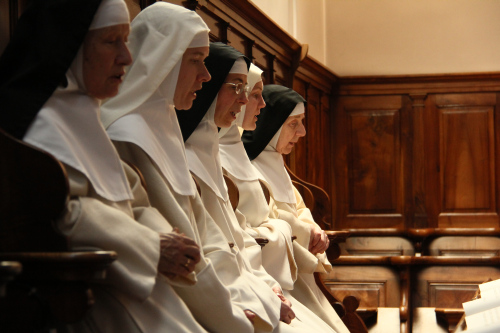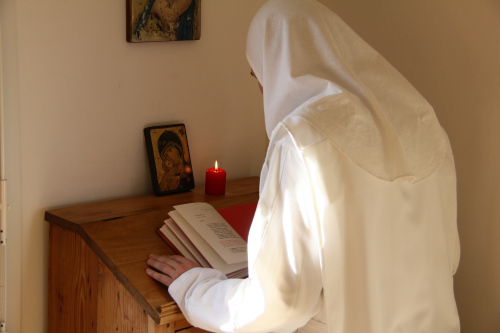
The liturgy is the noblest part of the life of a community of Carthusian nuns, a small ‘Carthusian church’, which is rooted in the daily celebration of the Eucharist. This is the pinnacle of our life, to which all other aspects of our observance converge, which lead us all to the Father in and through Christ and establishes the most intimate communion between us.
The Divine Office is an extension of this. Throughout the Liturgy, it is Christ who prays through us as our Priest. Our voices are his own voice that associates us with the whole Church, his Bride, with the hymn of praise he addresses to his Father. It is in the name of all that, day and night, we stand in the presence of the living God.

The whole life of the nuns is punctuated by the daily celebration of the liturgy. Like our vocation, simultaneously solitary and community, our Liturgy is divided between the Offices in the church and those offered in the secret of the cell.
At the church in the silence of the night we celebrate the Office of Matins and Lauds, which lasts for nearly 2 hours, and the Office of vespers which introduces us to the solitude of the evening in the cell. These Offices are chanted according to ancient Gregorian melodies that hold an important place. Since the beginning of our Order, the Carthusians have found in this chant an inspiration that brings interiority.

We celebrate in the solitude of our cells, and at the same time, the other Canonical Hours of the Office or “Little Hours” (Terce, Sext, None). Each office is preceded by that of the Blessed Virgin Mary, called the “Beata” office. Aware of our weaknesses, we resort to the maternal protection of Mary, who prepares us for prayer, and offer her the beginnings of our praise.
When we sing and chant, we are in close communion with our Carthusian brethren who celebrate the same liturgy, and with them we want to be those worshippers in spirit and truth that the Father seeks.
Our whole life tends to turn into an uninterrupted liturgy. It becomes more explicit when we offer community prayer and prayer in solitude. The nun thus becomes a sign of the Church which praises and sings to her Lord, who intercedes and begs for her brothers and sisters in humanity; who forgives and hopes; who contemplates and loves; waiting for the Bridegroom to come.

*
Listen
The Carthusian nuns pray the Offices and the Holy Mass using the same liturgical books as the monks. The psalmody is chanted either in Latin or in the vernacular according to the houses, but the melodies of the Mass and antiphonaries for the day and night Offices are from the ancient Gregorian tradition dating back to the origins of the Order. Sung by women’s voices, they take on a character with distinctive colour and lightness.











